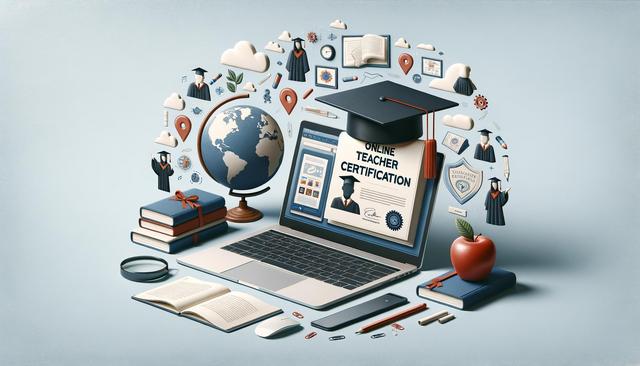The Rise of Online Teacher Certification Programs
Over the past decade, the demand for educators has remained steady, while traditional pathways to teaching careers have often required years of coursework and in-person training. To meet growing needs and evolving lifestyles, online teacher certification programs have emerged as a flexible and accessible solution. These programs are designed to accommodate a variety of learners—from recent graduates to professionals seeking a career change—by offering coursework that can be completed remotely and, in many cases, at your own pace.
Online certification options allow aspiring educators to balance their training with existing responsibilities, such as work or family. This makes it easier for individuals from diverse backgrounds and locations to enter the field. By removing geographical and scheduling barriers, these programs are opening doors for candidates who may have previously found traditional routes unattainable.
For anyone looking to get certified to teach online, these programs present an opportunity to pursue a meaningful career while maintaining flexibility in daily life.
Accredited and State-Approved: What to Look For
When considering online teacher certification, accreditation and state approval should be top priorities. Accredited teacher certification programs are reviewed to ensure they meet specific educational standards and prepare candidates effectively for teaching roles. State approval ensures that the certification you earn is recognized for licensure and employment within your chosen state.
Before enrolling, it’s essential to verify that the program you choose:
- Is recognized by the Department of Education or a regional accrediting body
- Offers state-approved pathways to licensure
- Includes a supervised teaching component or internship
- Aligns with your state’s subject area and grade level requirements
One of the top options for individuals seeking a streamlined route into the profession is fast-track teacher certification online. These programs are designed to help students complete coursework and clinical experiences in a condensed timeframe, often making it possible to start teaching within one to two years, depending on prior education and experience.
Alternative Pathways: Becoming a Teacher Without a Traditional Degree
Not everyone follows the same path into teaching, and today’s educational landscape reflects that reality. For those who want to become a certified teacher without a degree in education, alternative teacher certification online programs offer a viable and recognized route. These programs are particularly useful for those who hold a bachelor’s degree in another field but wish to transition into teaching.
Alternative certification programs provide essential pedagogical training and classroom experience, often tailored to high-need subject areas such as math, science, and special education. Participants typically engage in:
- Online coursework in teaching methods and classroom management
- Mentorship from experienced educators
- Supervised teaching experiences in local schools
In the USA, many states have embraced these pathways to address teacher shortages while maintaining standards of quality and professionalism. This flexibility allows more individuals to consider teaching as a career, especially those who might not have followed a traditional teacher preparation route.
Comparing Programs: What Makes a Certification Stand Out
With the growing number of online options, it’s important to understand what distinguishes the best online teacher certification programs 2025. While “best” can be subjective and depend on individual needs, several characteristics tend to define top-rated programs.
Key features to look for include:
- Comprehensive curriculum that covers both theory and practical skills
- Supportive services like career counseling, mentorship, and job placement assistance
- Affordable tuition and financial aid options
- Flexible scheduling and self-paced learning modules
Additionally, many highly rated programs offer specializations or endorsements in specific teaching areas, which can make candidates more attractive to employers. Whether you’re looking to teach elementary, secondary, or special education, choosing a program with strong outcomes and positive graduate feedback can help you make an informed decision.
Taking the time to research and compare your options ensures that you select a program aligned with your career goals and teaching interests.
Steps to Get Started With Online Certification
Beginning your journey toward certification involves a few key steps, and preparation is crucial to success. Fortunately, many online certification programs are designed to make the process straightforward and accessible.
Here’s a general roadmap to follow:
- Research and select a state-approved, accredited program that suits your goals
- Complete the application process, which may include transcripts and background checks
- Enroll in and complete required coursework and field experiences
- Pass any applicable state exams for licensure
- Apply for your teaching license and begin the job search
Each state has its own specific requirements, so it’s important to consult your state’s Department of Education for details. Many programs also provide advisors to help you navigate the requirements and stay on track throughout the process. Whether you’re pursuing fast-track teacher certification online or exploring alternative teacher certification online routes, knowing the steps helps you move forward with confidence.
Conclusion: A Flexible Future in Education
Online teacher certification programs are reshaping how people enter the education field. They offer an inclusive, flexible, and accessible path for individuals who may not have been able to pursue teaching through traditional means. Whether you’re looking to get certified to teach online, transition from another career, or become a certified teacher without a degree in education, there are programs designed to meet your needs.
By choosing accredited teacher certification programs that are state-approved and thoughtfully designed, you can position yourself for a rewarding career in the classroom. As more educational institutions adapt to digital learning, the ability to earn your credentials remotely is not just a convenience—it’s a gateway to professional growth and community impact.








